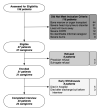Surviving critical illness: acute respiratory distress syndrome as experienced by patients and their caregivers
- PMID: 19865004
- PMCID: PMC2771584
- DOI: 10.1097/CCM.0b013e3181b6f64a
Surviving critical illness: acute respiratory distress syndrome as experienced by patients and their caregivers
Abstract
Objective: To characterize the effects of critical illness in the daily lives and functioning of acute respiratory distress syndrome survivors. Survivors of acute respiratory distress syndrome, a systemic critical illness, often report poor quality of life based on responses to standardized questionnaires. However, the experiences of acute respiratory distress syndrome survivors have not been reported.
Design: We conducted semistructured interviews with 23 acute respiratory distress syndrome survivors and 24 caregivers 3 to 9 mos after intensive care unit admission, stopping enrollment after thematic saturation was reached. Transcripts were analyzed, using Colaizzi's qualitative methodology, to identify significant ways in which survivors' critical illness experience impacted their lives.
Setting: Medical and surgical intensive care units of an academic medical center and a community hospital.
Patients: We recruited consecutively 31 acute respiratory distress syndrome survivors and their informal caregivers. Eight patients died before completing interviews.
Interventions: None.
Measurements and main results: Participants related five key elements of experience as survivors of acute respiratory distress syndrome: 1) pervasive memories of critical care; 2) day-to-day impact of new disability; 3) critical illness defining the sense of self; 4) relationship strain and change; and 5) ability to cope with disability. Survivors described remarkable disability that persisted for months. Caregivers' interviews revealed substantial strain from caregiving responsibilities as well as frequent symptom minimization by patients.
Conclusions: The diverse and unique experiences of acute respiratory distress syndrome survivors reflect the global impact of severe critical illness. We have identified symptom domains important to acute respiratory distress syndrome patients who are not well represented in existing health outcomes measures. These insights may aid the development of targeted interventions to enhance recovery and return of function after acute respiratory distress syndrome.
References
-
- Rubenfeld GD, Caldwell E, Peabody E, et al. Incidence and outcomes of acute lung injury. N Engl J Med. 2005;353:1685–1693. - PubMed
-
- Cheung AM, Tansey CM, Tomlinson G, et al. Two-year outcomes, health care use, and costs of survivors of acute respiratory distress syndrome. Am J Respir Crit Care Med. 2006;174:538–544. - PubMed
-
- Rubenfeld GD, Herridge MS. Epidemiology and outcomes of acute lung injury. Chest. 2007;131:554–562. - PubMed
-
- Angus DC, Carlet J. Surviving Intensive Care: a report from the 2002 Brussels Roundtable. Intensive Care Med. 2003;29:368–377. - PubMed
Publication types
MeSH terms
Grants and funding
LinkOut - more resources
Full Text Sources
Other Literature Sources
Medical


